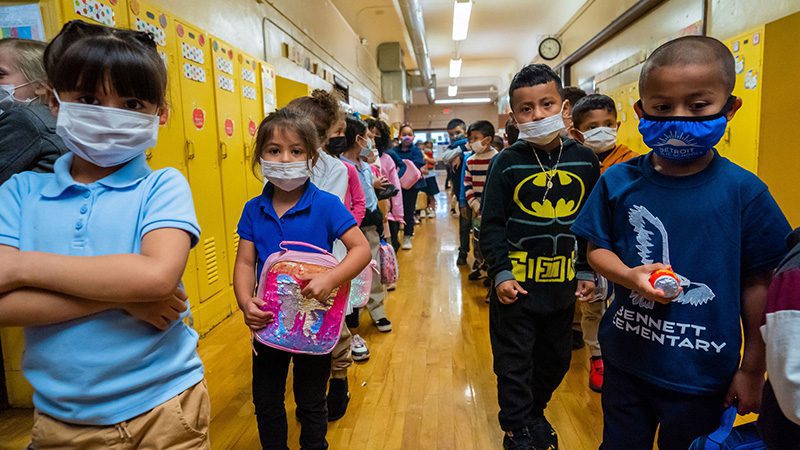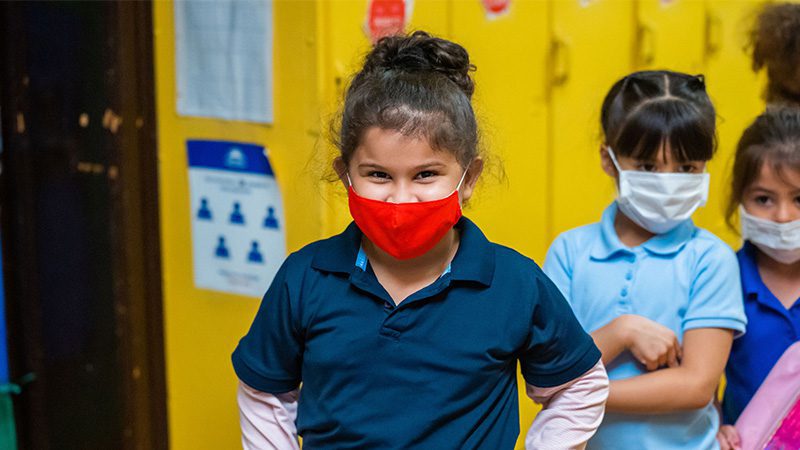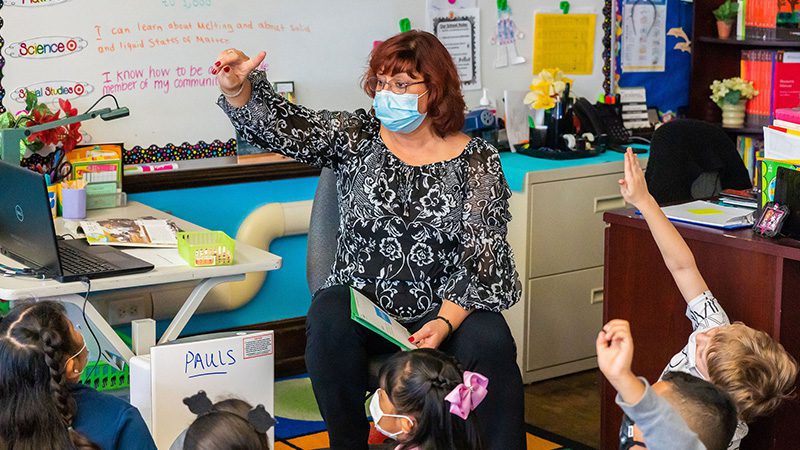Bennett Elementary
Combining Data, Intense Support and Culturally Responsive Instruction
By Courtney Wise-Randolph
Tucked at the very back of southwest Detroit, on the edge of Dearborn, is Bennett Elementary.
The community is richly diverse. Depending on where one stands at any given moment, a conversation can be overheard in English, Spanish or Arabic. Hijabs are common, and halal meat is as accessible as tamales. Varying religious backgrounds are noticeable and respected, and with multilingual grocers, retailers, libraries, parks and concert venues in the neighborhood, southwest Detroit is a cultural enclave unto itself.
It is within this context that faculty and staff at Bennett Elementary guide a community of mostly English learners to achieve outstanding academic growth year after year. Driven by the motto ‘Students First,’ school faculty and staff work together to meet students’ needs so that they can advance in the world.
Principal Kathryn Valadez-Herrera attributes the school’s success, in part, to its data-driven approach, combined with trusting relationships with students and their families and intense student support.
A culturally-responsive community
Principal Herrera is intentional about setting a tone in her building that makes all families feel like they belong in the school. In so doing, she builds trusting relationships with students by valuing students’ backgrounds and honoring the contributions their guardians lend to students’ success. This is no small point: a report published in March 2021 by the Education Trust and the nonpartisan education and social policy research organization MDRC shows that “strong relationships provide a foundation for student engagement, belonging, and ultimately, learning.”
Further, cultural responsiveness – or awareness and integration of the students’ cultures into teaching — is key to the existing trust between faculty and students—and faculty and parents. For instance, the school provides English courses during the school day to Spanish speaking parents at no cost. Students are also welcomed to use their first languages, and classroom books often have names and cultural references that are already familiar to students.
If you are aware of and sensitive to other cultures and customs, [people will] respect you as a person … and I feel that we have that in this community. The key to success is to make students understand that you are there for them and no matter what their situation is, you’re going to try to uplift them.”
Second Grade Teacher

The school also engages families through a variety of linguistically-responsive communications, including an app that provides translation for monolingual parents and caregivers. There is even an English learner interventionist on staff to further assist students towards growth in English fluency and content mastery.
“If you are aware of and sensitive to other cultures and customs, [people will] respect you as a person,” said second-grade teacher Eleni Paul, who was once an English learner herself. “And I feel that we have that in this community. The key to success is to make students understand that you are there for them and no matter what their situation is, you’re going to try to uplift them.”
She tells her story and invites other English learners to speak to her class to illustrate success in moving to a brand-new country and learning a new language. “I tell them, ‘Don’t think that you have to drop your native language in order to be successful in English.’ They have to be proud of who they are. Learning in a new language is one of those challenges that if you apply yourself, you can do it.”
Bennett’s English learners are doing exactly that, and the school’s strategies are clearly demonstrating results. From 2017 to 2019, Bennett’s English learners were among few students across the state that were consistently learning at faster rates than the majority of their peers. That’s not just relative to other English learners, either. EL students at Bennett demonstrate above average growth when compared to the growth rates of all students across the state with similar scores on Michigan’s annual student exams. As it’s not uncommon for English learner students to come to the school with no to little English skills, this is no small achievement.
Using data to inform student support
Just as the school is intentional about honoring students’ cultures and native language, there is also intentionality to support students to become academically successful across subject areas. To do that, Bennet’s entire staff is centered on understanding students’ data – and using data to inform instructional supports for students.
For example, at the start of new units, assessments are given to help tailor learning for each student. Students are also active partners in reviewing their data, setting learning goals, and planning strategies with their teachers to achieve them. Various assessments track student growth and progress. Some are used to track progress over each quarter, but the ones in which students are most closely involved occur each week.
What’s special about observing individual student binders at Bennett is the specificity with which even the youngest learners at the school not only record their actual scores, but write out reflections on their progress throughout the week. Especially remarkable is to see the progression as students’ self-reflection sheets evolve from being written with just consonant sounds — or even pictures — to complete sentences.
There is also an emphasis on building vocabulary across all subjects and reading in school and at home as often as possible to boost students’ fluency in English, alongside building a passion for learning new information.
One teacher at the school shared this example:
“I go through the same process where they’re given the word, then they draw to represent the word. Sometimes we push it further, depending on the word, and act it out, just so it becomes used. [After that], I catch them using the word in conversation.”


Intense student support to ensure student success
Bennett’s educators and parents say that data and cultural responsiveness must go hand-in-hand with intense student support to ensure every student succeeds.
Gloria Gutierrez, who’s had children attend Bennett over the last years, noted how engaged both teachers and students at Bennett are.
“I know I can see that the teachers are always involved in every step, and they always offer us help if we need something that they can provide to help the student succeed,” Gutierrez said. “You know when sometimes kids don’t feel good in school, they say, ‘Mom, I don’t want to go to school,’ but in my case, my son was always excited to go.”
The relationship between the school and families is so strong that Bennett’s dean, Beatriz Chapa, says the student discipline program is not punitive, like in some schools. Instead, it is primarily focused on making sure students are on time and attend school daily, and then teaching students how to model positive and caring behaviors toward one another so that their staff simply then acknowledges and reinforces it.
One of those programs that promote positive reinforcement is the Scholar Dollars program. Students can “spend” dollars in the school reward store that they earn for being ‘caught’ doing just about anything well. Rewards are highly valued by students, and some of the prizes, like books or special pencils, even further enrich student learning.
“Everybody is aware of the Scholar Dollars,” Chapa said. “We give them for everything that they do right—excelling on tests, meeting goals in math and reading, bringing back homework, being in attendance.” She added that parents are also active in reaching out to teachers, often before teachers reach out to them, and that creates a community where undesired behaviors have little opportunity to happen.
Armed with data-driven instruction, intense support, and a culturally responsive community, students at Bennett are well-primed to continue their trajectory of significant academic growth.
“As a school, we know what our students need,” Principal Herrera said. “We’re constantly trying to meet their needs so that students can advance in the world. We identify where each student is at and create an individual learning plan, where teachers will actually indicate what strategies can be used in order for that child to learn.”